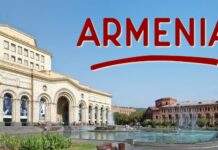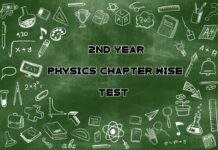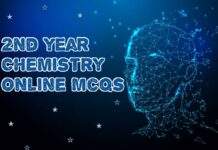CONTENTS
Table of Contents
GENERAL SCIENCE & ABILITY CSS Syllabus
(ACCORDING TO THE FPSC)
GENERAL SCIENCE (COMPULSORY)
Total Marks: 100
Time Allowed: 3 hours
GENERAL SCIENCE & ABILITY CSS Syllabus
1.Physical Sciences
i. Constituents and Structure: Universe, Galaxy, Light Year, Solar System, Sun, Earth, Astronomical System of Units.
ii.Process of Nature: Solar and Lunar Eclipses, Rotation and Revolution, Weather Variables (Global Temperature, Pressure, Circulation, Precipitation, Humidity) and Weather Variations.
iii.Natural Hazards and Disasters: Earth Quake, Volcanic Eruption, Tsunami, Floods, Avalanche, Travelling Cyclone (Tropical Cyclone, Middle Latitude Cyclone, and Tornadoes), Drought, Wildfire, Urban Fire. Disaster Risk Management.
iv.Energy Resources: Sources of Energy (Renewable i.e. LED Energy, Solar Energy, Wind Energy, and Non-Renewable Energy conservation and it’s sustainable use.
v.Atomic Structure: Chemical Bonding, Electromagnetic Radiations.
vi.Modern Materials/Chemicals: Ceramics, Plastics, Semiconductors. Antibiotics, Vaccines, Fertilizers, Pesticides.
2. Biological Sciences
i.The Basis of Life: Cell Structures and Functions (Subcellular Organelles such as Nucleus, Mitochondria, and Ribosomes).
ii.Biomolecules: Proteins, Lipids, Carbohydrates, and Enzymes.
iii.Plant and Animal Kingdom: A brief survey of plant and animal kingdom to pinpoint similarities and diversities in nature.
iv.A Brief Account of Human Physiology.
v.Common Diseases and Epidemics: Polio, Diarrhea, Malaria, Hepatitis, Dengue their Causes and Prevention.
vi.New Model Concept of Producing BIO Fuel Method
3. Environmental Science
i.Environment: The Atmosphere (Layered Structure and Composition), Hydrosphere (Water Cycle, Major Water Compartments), Biosphere (Major Biomes) and Lithosphere (Minerals and Rocks, Rock Types, Plate Tectonics).
ii.Atmospheric Pollution: Types, Sources, Causes and effects of major air
pollutants (COx, Particulate Matter, NOx, SOx, Tropospheric Ozone, Volatile Organic Compounds, Dioxins). Regional and Global air pollution issues (Acid-rain, Ozone Depletion, Greenhouse Effect, and Global Warming). International agreements on air pollution control (Montreal Protocol and Kyoto Protocol).
iii.Water Pollution: Types, sources, causes and effects of major water pollutants (Synthetic Organic Chemicals, Oxygen Demanding Wastes, Plant Nutrients, Thermal Pollution, Infectious Agents, Sediments, Radioactivity, Heavy Metals, and Acids).
Drinking water quality and standards.
iv.Land Pollution: – Solid waste management and disposal.
Role of Remote Sensing and GIS in Environmental Science.
Population Planning.
4. Food Science
i.Concept of Balance Diet: Vitamins, Carbohydrates, Protein, Fats, and oil,
Minerals, Fiber.
ii.Quality of Food: Bioavailability of Nutrients, Appearance, Texture, Flavor, Quality of Packed and Frozen Food, Food Additives, Preservatives, and Antioxidants.
iii.Food Deterioration and its Control: Causes of Food Deterioration, Adulteration, Food Preservation.
5. Information Technology
i.Computer (Hardware & Software Fundamentals); I/O processing and data storage, Networking & Internet Standards, Application, and Business Software, Social Media Websites. Information Systems. Fundamentals of artificial intelligence.
ii.Telecommunications: Basics of Wireless Communication (Mobile, Satellite, Surveillance and GPS and Fiber Optic etc.
Part-II (General Ability) 40 Marks
6. Quantitative Ability/Reasoning
- Basic Mathematical Skills.
- Concepts and ability to reasons quantitatively and solve problems in a quantitative setting. Basic Arithmetic, Algebra, and Geometry (Average, Ratios, Rates, Percentage, Angles, Triangles, Sets, Remainders, Equations, Symbols, Rounding of Numbers
- Random Sampling.
7.Logical Reasoning and Analytical Reasoning/Ability
i. Logical Reasoning; includes the process of using a rational, systematic series of steps based on sound mathematical procedures and given statements to arrive at a conclusion
ii. Analytical Reasoning/Ability; includes visualizing, articulating and solving both complex and uncomplicated problems and concepts and making decisions that are sensible based on available information, including demonstration of the ability to apply logical thinking to…………























